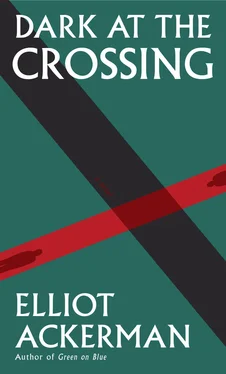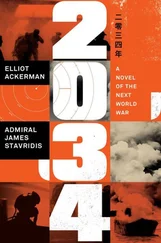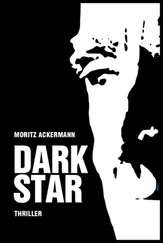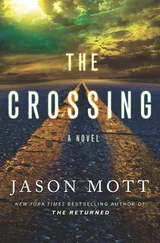Jim returned to the room. When he saw Kareem leaning over the table and freed from his seat, his eyes widened, becoming insufficient apertures to contain his anger. Immediately, Haris held up the map. “He told me where his uncle lives.”
Jim snatched the sketch from Haris and looked it over. “You sure he’s telling the truth?”
Haris nodded, feeling certain about this.
Kareem sat back down, and Jim towered over him, holding the sketch toward his face. “You know what we’ll do if you’re bullshitting us?”
Kareem nodded as if he knew.
Jim nodded as well, as if he knew.
Jim and Haris left the cell, shutting its door behind them. They stepped into the hall and walked past the MP, who still sat at his desk reading.
“Done already?” he asked. “That was fast.”
Jim said nothing, but left his interrogation clearance and Kareem’s personal effects on the MP’s desk.
The steel gate with its eight-pointed star creaked open as Haris and Jim stepped outside. The evening had turned to night, and with it came a chill. Jim pulled a small flashlight from his pocket and took another glance at the map. “Looks good,” he said. “I know just about where this is.”
Haris said nothing.
“How the hell did you get him to talk?” asked Jim.
Haris paused, his eyes resting on the orange halo of floodlights that illuminated Hurricane Point. These marked the way back to his trailer in the terp ghetto. “I said if he didn’t tell you, he’d be left in a dark cell until we found his uncle and that this would take a very, very long time.”
Jim laughed softly. He kicked at the dirt with the toe of his desert-suede combat boot, and then he rested a heavy palm on Haris’s shoulder. “See, Abadi, I told you. They’re all afraid of the dark. Ignorant fucks.”
Haris found Daphne in the cafeteria on the hospital’s ground floor. She sat at a table by herself, next to a wide bay window. A block of afternoon sun washed out the room, glinting against the quartz stud she wore. A cup of tea sat in front of her, its saucer resting on a pile of broken sugar packets. Her red sunglasses covered her eyes. Haris sat next to her. She didn’t move. He touched her shoulder. She startled awake, pushing her sunglasses up her head. With her fingertips, she wiped the sleep from her eyes.
“You all right?” asked Haris.
She blinked a few times. “I’m fine,” she said. “I don’t sleep well at home.” She looked at him, his expression alive with whatever he’d just seen. “You all right?”
“I’ve found something,” he said, and told her about Saied, the robbery at the border, the red Che T-shirt in the basement. His story poured quickly from him, the sentences blending and pursuing each other, becoming barely intelligible in places, but conveying the essential facts of what had happened. Daphne nodded steadily, taking a few sips of her tea, which had turned cold over the course of her nap.
“I’m not sure I understand,” she said.
Haris froze, his mind doubling back over all he’d told her. “What do you mean you don’t understand?”
Daphne rested her tea on the saucer. “Why don’t you just go down there and get your stuff back?” she asked.
“Without some leverage, Saied won’t return what he took.”
“You think I’m leverage?”
“He’s a thief,” said Haris. “He’s committed a crime. You could tell the hospital staff to remove him.”
“If they removed every Syrian who’d committed a crime, the hospital basement would be empty!” A few tables down, a pair of nurses stared at Daphne. She spoke more softly. “Three years of this has turned honest people into criminals. He is probably, like you, a good man.”
“All I want is to cross the border,” said Haris. “If you won’t help because of what he did to me, help because I’m willing to cross when so many aren’t.”
“I never said I wouldn’t help.”
Haris smiled at Daphne. She returned a sharp look, which cooled his enthusiasm. “But I won’t help under the assumption that you’re a good man punishing a bad one,” she added. “I’m exhausted by those ideas. He took something from you. You’re going to take it back, nothing more. Agreed?”
Haris nodded, and they stood, leaving the brightly lit cafeteria for the elevator bank. As Daphne threw away her tea, she leaned over to Haris. “I wonder what he did before the war.”
“Not sure, why do you ask?”
“Just curious,” said Daphne. “I guess none of that matters.”
—
Haris turnedthe doorknob and pressed the jamb with the toe of his boot. It was unlocked. Daphne stood behind him. Her eyes ran along the corridor, checking that none of the hospital staff saw them creep inside. The other patients watched with a languorous curiosity, interested, but too tired to question what Haris and Daphne wanted with this man.
The door hinges creaked as they entered. A shutter covered the window in the room’s top corner. Neither could see a thing. Haris shut the door behind them, pressing the button on the knob’s top. It locked with a metallic click. Across the room came a rustling of sheets.
“I’m supposed to rest,” spoke a weak, sleepy voice. Haris recognized it immediately, feeling a swell of relief. He then groped for a moment by the near wall, until Daphne’s assured hand located the light switch. She flipped it on.
Saied clamped his eyes shut. “I told you, I’m supposed to rest.”
He lay on his back, swaddled below the waist in white bed linens. A light blue hospital blanket was draped over his shoulders, keeping him warm. His exposed chest and stomach dried in the open. The old, jagged scar ran the length of his belly from breastbone to groin. Carved parallel to it was a new, clean scar, the result of his most recent surgery. The doctors had left his wounds unbandaged, to heal in the foul air. But as clean as his fresh scar appeared, his old scar had worsened. It had purpled in the week or so since Haris saw him last, and his skin had become jaundiced, sticking nearly translucent to a cavern of ribs that smelled like a bellows with his every breath, concealing the deeper wounds to his organs.
“You’re supposed to rest!” snapped Haris. “What am I supposed to do?”
At the sound of Haris’s voice, Saied torqued upright in his bed. Before he could speak, he winced against the pain from both his fresh wound and his old one. Saied’s arms clutched toward his stomach, but he dared not touch the agony of his scars. His mouth opened, but it took a moment for his breath to form words. Winded, he said: “Of course you’d find me here.” Then a weak, amazed laugh escaped him.
He lay back down.
“I want what you took from me,” said Haris. Flung across the stool at Saied’s bedside were the red Che T-shirt, a pair of worn-out tennis shoes, and the black parka. Haris began rifling through the pockets.
“You won’t find your things in there.”
From the clothing, Haris pulled a half-empty pack of Gauloises, a cheap Nokia smartphone, and a thin billfold — less than fifty dollars’ worth of Turkish lira and Syrian pounds. He tossed the contents on the floor.
“You took nearly three thousand dollars from me!” shouted Haris.
Daphne reached over, gently grabbing his arm at the biceps. She held her index finger to her lips. “Shhh,” she said, as if soothing Haris but also telling him to keep his voice down lest the medical staff hear them.
Haris stepped to the edge of Saied’s bed, towering over him. “Where’s my passport?” he mumbled through a clenched jaw.
“I sold my share of your things,” whispered Saied. His eyes didn’t meet Haris’s but wandered up toward the ceiling and the shuttered window. “How do you think I paid my way to the hospital?”
Читать дальше












